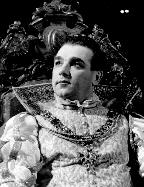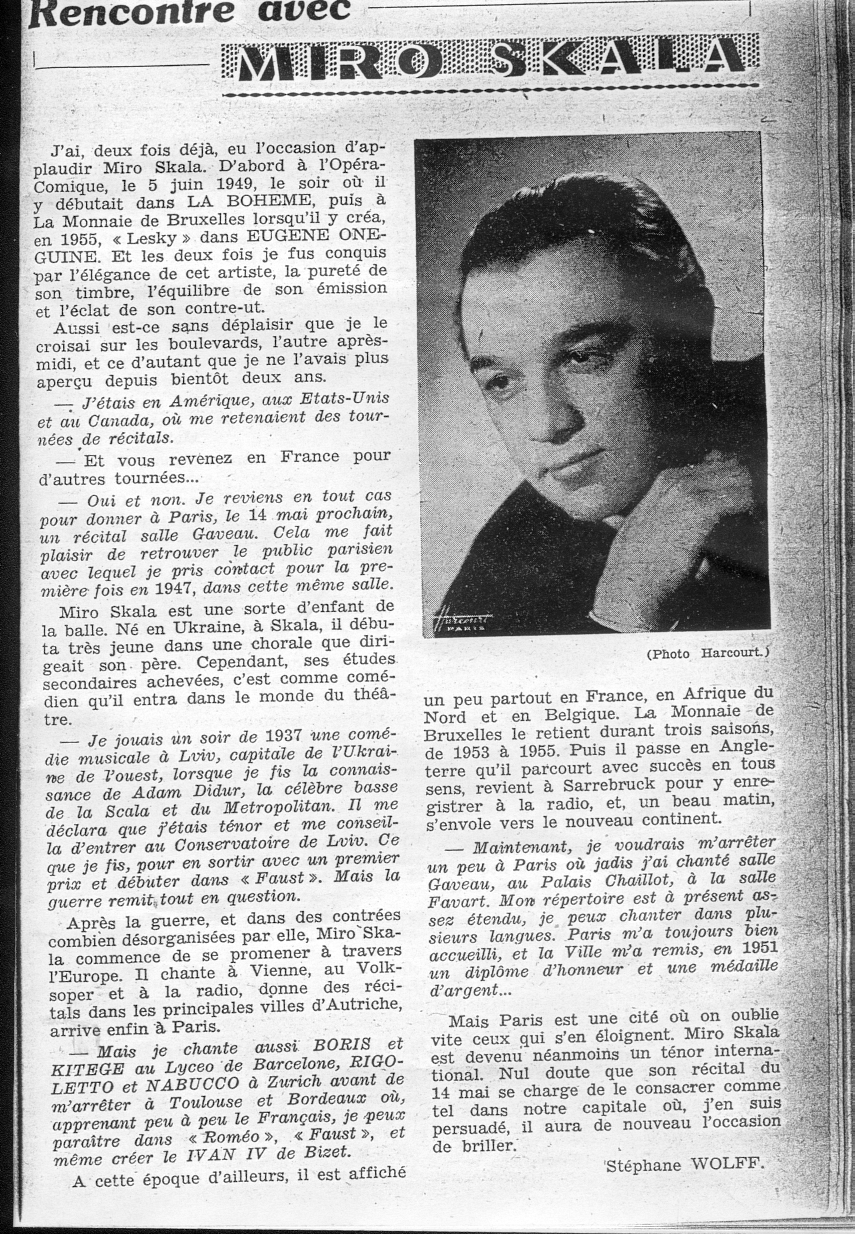Miro Skala-Starytskyj
Miro Skala (Myroslav Starytskyj) was born June 13th, 1909 in the town of Skala, in western Ukraine. He started singing early as his father was the local choir director. Until his late twenties he mostly sang musical comedy. On one such occasion, in 1937, a member of the audience happened to be Adam Didur. The famous basso recognized the young singer's potential for opera and encouraged him to enter the Institute of Music in Lviv. After completing two years of study with Didur at the Institute he received the first prize in voice and an opportunity to make his operatic debut as Faust. Starytskyj continued singing at the Lviv Opera Theater (Barinkay in Zigeunerbaron, Pinkerton in Madama Butterfly, Andrij in Zaporozhets za Dunajem) while enrolled in the Vienna Academy of Music for further vocal study. He received his diploma from the Academy with distinction in 1942 and was immediately offered a contract as first tenor with the Pfalztheater Kaiserslautern. In 1943/44 he sang with the Opéra National du Rhin in Strasbourg. This was a great opportunity that also provided valuable experience with guest appearances in Brno, Leipzig, Prague and Berlin. In 1945 Starytskyj returned to Vienna to join the Volksoper Wien and started singing from then on under the name of either "Miro Skala" or "Miro Skala-Starytskyj". He achieved such popularity in Vienna and in all the major venues in Austria that in 1946 the Bureau Concerts de Valmalete engaged him for a series of concerts in France. In January of 1947 he made his French concert debut at Salle Gaveau in Paris. Many appearances followed on radio, television, in concerts and opera in Toulouse, Bordeaux and Paris. He improved his French repertoire singing Faust, Roméo, Nadir, Werther. Skala sang at the Gran Teatre del Liceu in Barcelona in 1948 (Grigorij in Boris Godunov, Sadko and Kitezh), at the Opéra National de Paris in 1949, at the Opernhaus Zürich in 1950 (Duke of Mantua in Rigoletto, Ismaele in Nabucco). On October 12th, 1951 he created the role of Igor in the delayed premiere of Bizet's Ivan IV at the Grand Théâtre de Bordeaux. By 1952 Skala had appeared in almost all the major opera houses of France, Belgium, Switzerland and North Africa. From 1953 to 1955 he was under contract with the Théâtre Royal de la Monnaie in Brussels singing Rodolfo in La bohème, Turiddu, Lenskij, Faust, Pinkerton, Nadir, Duke of Mantua and Cavaradossi. Between 1955 and 1962 Skala made several concert tours of the United States, Canada and Great Britain. In 1963 Skala founded a music-drama studio in Paris, where he taught until his untimely death in 1969. All in all Skala sang over thirty operatic roles and performed in over a hundred concert recitals. Skala recorded several albums of art songs and arrangements of Ukrainian folk songs and a collection of unpublished opera arias. Most of his recordings with orchestra were done with the Belgium National Orchestra or the orchestra of the Théâtre Royal de la Monnaie with Rene Defossez always conducting.
I wish to thank Victor Roman for the biographical notes.
I wish to thank Igor Milner for the recordings (Roméo et Juliette, Barvinskyj song). I wish to thank Georges Voisin and Lysiana Medine for the recording (Pêcheurs). |

